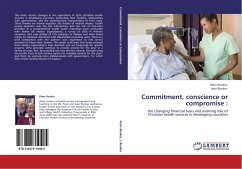This book reports changes in the operations of CHSs (Christian health services) in developing countries, particularly their funding, relationships with governments, and the socioeconomic characteristics of their users. Three themes are woven together: the history of medical mission, health service evolution over the last half-century, and the role of non-state providers in a comprehensive health sector. Interviews were conducted with twelve UK mission organisations, a survey of CHSs in thirteen countries, and case studies of CHS provision in Malawi and India based mainly on extensive interviews with stakeholders including users. There is a brief comparison with the authors own experience as CHS service providers in Papua New Guinea. The results confirmed that funds received from mission organisations have declined and are frequently for specific projects. CHSs generally continue to provide services for the poor in a variety of ways: first, by providing low cost services; second, through using the profits from hi-tech tertiary services to subsidise services for the poor; and third, by working more collaboratively with governments, for which they receive varying degrees of support.








